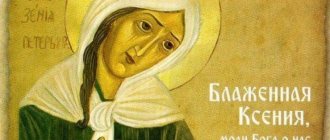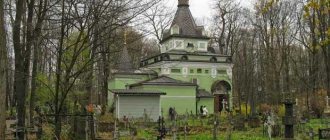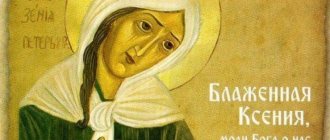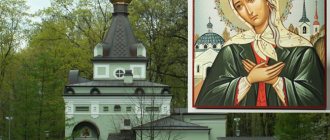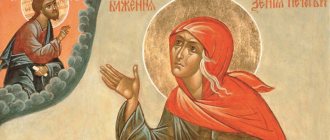Portal "Wonderful Diveevo"
05/02/2019 19:42:38| Holy Blessed Xenia of Petersburg for Christ's sake, holy fool |
Holy Blessed Xenia was born in the first half of the 18th century from pious and noble parents; Her father's name was Gregory, and her mother's name is unknown. Upon reaching adulthood, Ksenia Grigorievna married the court singer, Colonel Andrei Feodorovich Petrov, and lived with her husband in St. Petersburg. But the Lord did not decree for long that the young couple should walk together along the path of life; the angel of death separated them: Andrei Feodorovich died, leaving Ksenia Grigorievna a widow in the twenty-sixth year of her life. This unexpected blow struck Ksenia Grigorievna so strongly, influenced the young widow so much that she immediately seemed to forget everything earthly, human, all the joys and pleasures, and as a result of this, she seemed to many to be crazy, having lost her mind. Even her relatives and friends began to look at her this way, especially after Ksenia gave away all her property to the poor and gave the house to her good friend, Paraskeva Antonova. Ksenia's relatives even submitted a petition to the authorities of the deceased Andrei Feodorovich, asking not to allow Ksenia to give away her property in madness. The superiors of the deceased Petrov summoned Ksenia to their place, but after talking with her they were completely convinced that Ksenia was completely healthy, and therefore had the right to dispose of her property as she pleased. Freed from all earthly cares, Saint Xenia chose for herself the difficult path of foolishness for Christ's sake. Dressed in her husband’s suit, that is, putting on his underwear, caftan, camisole, she began to assure everyone that Andrei Feodorovich did not die at all, but his wife Ksenia Grigorievna died, and then she never responded if they called her Ksenia Grigorievna, and always responded willingly if they called her Andrei Feodorovich. Ksenia did not have any specific place of residence. For the most part, she spent the whole day wandering around the St. Petersburg side and mainly in the area of the parish of the Church of St. Matthew the Apostle, where at that time poor people lived in small wooden houses. The strange costume of the poor, barely shod woman, who had no place to lay her head, her allegorical conversations, her complete meekness, and gentleness often gave evil people and especially street boys a reason and courage to mock the blessed one. The blessed one endured all these reproaches without complaint. Only once, when Ksenia had already begun to be revered as a saint of God, did the residents of the St. Petersburg side see her in great anger. The boys’ bullying that time exceeded all human patience; they swore and threw stones and dirt at her. Since then, local residents have put a stop to her street harassment. Little by little they became accustomed to the blessed one’s oddities. They began to offer her warm clothes and money, but Ksenia never agreed to exchange her rags and spent her entire life in a red blouse and a green skirt, or vice versa - a green blouse and a red skirt. Apparently these were the colors of her husband's military uniform. She also did not accept alms, but only took from good people the “king on a horse” (kopecks with the image of a horseman) and immediately gave this “king on a horse” to the same poor people as she herself. Wandering all day long through the dirty, unpaved streets of St. Petersburg, Ksenia occasionally visited her friends, dined with them, talked, and then set off to wander again. Where she spent her nights remained unknown for a long time. Not only residents of the St. Petersburg side became interested in this, but also the local police, for whom the location of the blessed one at night even seemed suspicious. It was decided to find out where this strange woman spends her nights and what she does. It turned out that Ksenia, no matter what time of year or weather, went to the field for the night and stood there in kneeling prayer until dawn, alternately bowing to the ground on all four sides. Another time, workers who were building a new stone church at the Smolensk cemetery began to notice that at night, during their absence from the building, someone was dragging whole mountains of bricks onto the top of the church under construction. The workers marveled at this for a long time and wondered for a long time where the brick came from. Finally they decided to find out who this free, tireless worker could be, carrying bricks for them every night. It turned out that there was a servant of God, blessed Ksenia. For her great deeds and patience, the Lord glorified his chosen one during her lifetime. The servant of God Ksenia was awarded the gift of insight into hearts and the future. She predicted the death of Empress Elizabeth Petrovna and Ivan Antonovich; she secretly predicted the death of the merchant Krapivnina, saying: “The nettle is green, but it will soon fade,” and she predicted marriage for one poor girl. Teaching people truthfulness, Blessed Xenia often revealed the secrets of those people whom she visited. The mercy of God overshadowed Ksenia so much that even those whom she visited or from whom she ate food were happy and successful in business. Both the merchants and the cab drivers all tried to serve her in some way; Particular well-being visited those to whom Blessed Xenia herself gave something. In the seventy-first year of her earthly life, she rested in the sleep of a righteous woman. Her body was buried in the Smolensk cemetery. And many signs of God’s mercy began to take place at her tomb. Through the prayers of Blessed Xenia, the Lord saved one girl from a terrible marriage with an escaped convict who pretended to be the colonel he had killed. After a memorial service was performed over her grave, the sufferers received healing, broken peace was restored in families, and the needy received what they needed. Over time, a chapel was built over the grave of Blessed Xenia, to which her many admirers flocked. After the revolution, the Bolsheviks closed the chapel, but no effort by the atheists could suppress among the people the memory of the blessed one and the faith in her prayerful intercession before the throne of God.
The Monk Xenia (V), in the world of Eusebius, was the only daughter of a noble Roman senator. From her youth she strove for God. To avoid the marriage ahead of her, she secretly left her parents' house with two devoted maids and sailed on a ship. Having met, by the providence of God, with the rector of the monastery of the Holy Apostle Andrew, which was located in the city of Milass, in Caesarea, she begged him to take her, along with her companions, to Milass; Having changed her name, she called herself Ksenia. In Milassa she bought land, built a temple in the name of St. Stephen and founded a nunnery. Soon after this, the Bishop of Milassa, Paul, ordained Xenia as a deaconesses, as being fully worthy of this title due to her virtuous life. The saint provided help to everyone: she was a benefactor for the poor, a comforter for the grieving, and a mentor for sinners. She had deep humility, considering herself worse and more sinful than everyone else. In her exploits she was guided by the advice of the Palestinian ascetic St. Euthymius. With her high life, Saint Xenia attracted many souls to salvation. The death of the holy virgin, during prayer, was marked by the Lord by the appearance in the sky above the monastery of a sign in the form of a light crown with a cross shining in the middle of it, which accompanied the body of the saint, carried into the city to the people, and was preserved until the very moment of burial. Many sick people, touching the relics of the saint, received healing.
Blessed Matrona of Moscow is also loved and revered not only in Rus' but also beyond its borders
We magnify you, holy righteous old lady Matrono, and honor your holy memory, for you pray for us to Christ our God. body icon of Matrona of Moscow
| Martyr John of Kazan. |
Martyr John of Kazan suffered for Christ in the city of Kazan on January 24, 1529. During the reign of Grand Duke Vasily Ivanovich, the Tatars attacked Nizhny Novgorod. Many residents were captured and taken to Kazan. Among them was God-fearing John. During the division of the captives, it went to the khan's relative Alei-Shnur. During the day, John honestly served his master, and at night he prayed, remaining without sleep, patiently enduring insults and ridicule. The owner decided to make his slave a fan of Mohammed, but John firmly declared that he confessed Jesus Christ as Lord God. In winter, the Tatars brought him to a Russian cemetery, mortally wounded him with swords and threw him bound into the snow. Waking up at night, Saint John reached the courtyard of the Russians living in Kazan, asked to call a priest, received Holy Communion, prayed all night, and died the next morning. The Monk Macedonius, a Syrian hermit, lived at the end of the 4th – beginning of the 5th centuries. At the beginning of his ascetic journey, he led the life of a wanderer, wandering through the mountains of Phenicia, Cilicia and Syria for 25 years, and then found refuge in a deep ditch and lived under the open sky in the Syrian desert, avoiding human glory, since many people came to him, looking for spiritual help and guidance. Only in old age did he yield to the requests of people and began to live in a cramped cell built for him. During his long life, Saint Macedonius ate only barley, crushed and moistened with water, for which he was nicknamed “critophagus” (from the Greek η κριθή - barley and φάγομαι - to eat), and only when he felt a loss of strength, he began to eat a little bread. During his ascetic life, he was awarded by the Lord the gift of casting out demons and healing the sick. The monk died around 420, having reached the age of 70.
| Svtt. Great Permian Pitirim, Gerasim and Jonah |
Saint Gerasim, Bishop of Velikoperm (Ustvym) , was the third bishop of the newly enlightened Zyryan people and a worthy follower of Saint Stephen, the enlightener of Perm. Having been elevated to the Perm see after 1416, he was a participant in the Councils: 1438, which condemned the union and Metropolitan Isidore, and 1441, which determined that the metropolitans of all Rus' should be appointed by the Council of Russian Shepherds. The saint vigilantly took care of his unsettled flock, who suffered from the raids of the Novgorodians, especially from the pagan Voguls, fearlessly appearing in their camps and convincing them to stop robbing the villages of defenseless Permian Christians. During one of his trips around the Perm land in 1441, he was killed (according to legend, strangled with an omophorion) by a Vogul servant. He was buried in the cathedral of the first bishops of Perm, later in the Annunciation Church in the village of Ust-Vym, located northeast of the city of Yarensk, on the Vychegda River. The celebration of his memory was established in 1607. On January 29, a common memory is celebrated for the three Perm saints - Gerasim, Pitirim and Jonah. Venerable Martyr Anastasius of Persian. Born in Persia. His father Vav was a magician, a famous teacher of sorcery, who also taught his son. Anastasius, while serving as a warrior for the Persian king Khosroes, heard about the Life-Giving Cross of the Lord, rumors of the glory and power of which spread throughout Persia. The tree of the cross amazed with its unusual miracles, so that many said: “The Christian God has come to Persia.” Having heard about this, the young man began to ask about the earthly life of the Savior, and the grace of God touched his heart, and the fire of faith lit up in his soul. When he was sent to war in Greece, having reached the city of Chalcedon, he remained to live with a Christian Persian, who instructed him in the true faith. Arriving in Jerusalem, he received Baptism and entered a monastery, where he labored, adorning himself with humility, meekness and hard work. After seven years in the monastery, on the eve of the Feast of the Resurrection of Christ, it was revealed to him that a martyrdom for Christ awaited him. Arriving in Caesarea, St. Anastasius was captured by soldiers who mistook him for a spy. At his trial before Khan Marzavan, he confessed himself to be a Christian, for which he was shackled in iron chains and taken to stone-mason work. Seeing that the martyr could not be shaken, he was given over to cruel torture along with 70 prisoners, among whom were many Christians. They were all strangled on the river bank. The head of St. Anastasia was cut off and brought to the king, and the body was thrown to the dogs, but no one touched him. A monk sent from the Jerusalem monastery, where St. Anastasius bribed the guards and buried the martyr. The martyrdom of the saint followed in 628. Subsequently, the relics of St. Saint Martyr Anastasius of Persian were transferred to Palestine, from here to Constantinople, and from Constantinople to Rome, where they are kept to this day (one part in one of the country monasteries, the other in the Church of the Holy Cross). The holy martyrs Babyla Sicilian and his two disciples Timothy and Agapius lived in the 3rd century in the vicinity of Rome. Saint Babyla was born in the city of Reupol into a wealthy family and was raised by his parents in the Christian faith. Even in his youth, he left earthly things, secretly left his parents’ house and settled on a mountain, where he spent all his time in fasting, prayer and silence. Two of his disciples labored with him: Agapius and Timothy. Avoiding the persecution of the pagans, he retired with them to the island of Sicily, where he converted many infidels to Christ. The head of the island, irritated by the educational activities of Saint Babyla, ordered him to be seized along with his disciples and subjected to cruel torture. The saints patiently endured their suffering, and all three died by the sword. Their bodies were thrown into the fire, but the flames did not touch the soldiers of Christ. They were buried on the island of Sicily by local Christians.
Prayers of Blessed Xenia of St. Petersburg
Blzh. Ksenia Petersburgskaya
First prayer
Oh, holy all-blessed mother Ksenia! Living under the protection of the Almighty, guided and strengthened by the Mother of God, you have received hunger and thirst, cold and heat, endured reproach and persecution, received the gift of clairvoyance and miracles from God, and you have received peace under the canopy of the Almighty isishya. Now the Holy Church, like a fragrant flower, glorifies you. Standing at the place of your burial, before your holy image, as if you are living, existing with us, we pray to you: accept our petitions and bring them to the Throne of the Merciful Father in Heaven, as boldly She who has knowledge towards Him. Ask for eternal salvation for those who flow to you, our generous blessing for good deeds and undertakings, deliverance from all troubles and sorrows. Stand before our All-Merciful Savior with your holy prayers for us, unworthy and sinners. Help, Holy Blessed Mother Xenia, illuminate the infants with the light of Holy Baptism and seal the gift of the Holy Spirit, youths and young women in faith, honesty, fear of God and chastity educate and grant them success in learning; heal the sick and ailing, send love and harmony to families, be worthy to strive for good as a monk and be protected from reproach, shepherds establish in the fortress of the Holy Spirit, people and preserve our country in peace and serenity, pray for those deprived of the Holy Mysteries of Christ at the hour of death. For you are our hope and hope, quick hearing and deliverance, we send thanks to you and with you we glorify the Father, and the Son, and the Holy Spirit, now and ever, and to the ages of ages. Amen.
Second prayer
Oh, our glorious holy blessed mother Xenia, warm for us before God in the prayer book! As before we fell to your tombstone, now, after your glorification, we resort to your relics, we ask: pray to the Lord, may He sanctify our souls and bodies, may He enlighten our minds and purify conscience from all filthiness, unclean thoughts, evil and blasphemous intentions and from all exaltation, pride and arrogance, arrogance and insolence, from all Pharisee hypocrisy, and from all our cold and evil customs; May He grant us sincere repentance, contrition of our hearts, humility, meekness and quietness, reverence, and spiritual understanding with all prudence and gratitude. Hidden from the wise of this age, but known to God, ask our Russian country for deliverance from severe troubles, for renewal and correction of all our lives, keep us in every pious Orthodox confession the gift of the Christian faith, so that in pleasing you we may be honored all the days to sing, give thanks and glorify the Father and the Son and the Holy Spirit, the Trinity of One Essence, Life-Giving and Indivisible forever and ever. Amen.
Prayer three
Oh, holy saint of God, blessed Ksenia! Look mercifully with your eye on us, servant of God (names), tenderly praying to your honorable icon and asking you for help and intercession. Extend your warm prayers to the Lord our God and ask for forgiveness of sins for our souls. Behold, with a contrite heart and a humble spirit, we call upon you a merciful intercessor to the Lady and a prayer for us sinners, as you have received from Him the grace to pray for us and deliver us from troubles. We therefore ask you, do not despise us, unworthy, who pray to you and demand your help, and intercede for everyone everything that is useful for salvation, as if by your prayers to the Lord God, having received grace and mercy, we will glorify everyone good Source and Gift Giver and One God, glorified in the Trinity of Saints, Father and Son and Holy Spirit, now and ever and unto ages of ages. Amen.
Personal petition
Oh, our great heavenly intercessor, holy blessed mother Xenia! Ask the Greatly Gifted God for your servants (names), who flow to you with hope (the content of the petition), and for help and instruction in all everyday needs and needs, and for deliverance from all troubles and sorrows. Amen.
How to ask a saint to meet your loved one
As many clergy note, it is important to pray with a certain zeal, as they say, to bear the labor of prayer. Diligent prayer over a period of time tests the degree of importance of the desire. And the Lord Himself determines the time. It is He who arranges everything in our lives. Therefore, priests bless ending prayers with the following request:
“Blessed Xenia, arrange everything according to the will of God.”
How exactly to pray is determined by each person independently, according to the degree of his spiritual maturity. However, it is recommended to consult with a confessor or a clergyman in carrying out the feat of prayer. Reading an akathist or canon, or praying in your own words must be coupled with sincere faith and acts of mercy.
It is wonderful if you have the opportunity to make a pilgrimage to the relics of Blessed Xenia. But if this is not possible, then on the official website of the Smolensk Church, as well as on the official pages on social networks, it is written in great detail how to order a prayer service in the chapel or write a note with personal petitions to Saint Xenia, which will be printed and placed in a special box located next to chapel.
12
October
1902
The consecration of the chapel of St. Xenia of Petersburg at the Smolensk cemetery.
Examples of the blessed one’s help in establishing a family
The famous Orthodox author Elena Kucherenko devoted one of her articles to the story of meeting her future husband, which happened through the prayers of Blessed Ksenia. Elena worked and studied in graduate school at one of the Moscow theater universities and at the same time, as a newly minted Christian, she dreamed of a quiet family life somewhere in a small village, preferably next to a monastery, surrounded by a bunch of children and under the command of an Orthodox bearded husband. Years passed, but my heart still didn’t skip a beat.
While in the Cathedral of Christ the Savior, she came across a small book about Saint Xenia of St. Petersburg, unknown to her at that time. It told about the miraculous help of the saint, including in family matters, and as proof - the testimonies of many believers, and on the last page the address of the chapel was indicated. There was no opportunity to go to St. Petersburg, and the girl wrote a tearful letter to the holy righteous woman with a request to help her get married and a donation of 150 rubles (all that was in her wallet).
This is interesting: Letters to St. Ksenia: how to write notes to the blessed one
Two or three weeks later, Elena received a response letter: a prayer service had been served, thanks for the donation, everything would be fine. And in the letter is a petal of a flower consecrated at the grave of St. Xenia. 10 days later, in the small Ukrainian town of Energodar, where she went with her friends, Elena met her future husband Vadim, bearded and with a cross on his chest. Three days later he proposed, and within a year the young couple signed and got married. True, the quiet family life in Energodar turned out to be not as heavenly as in dreams, and the young couple moved to Moscow. Today they are raising five sweet daughters.
